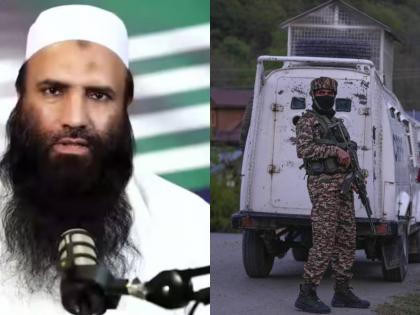'Now I Am Famous': Pahalgam Attack Mastermind Saifullah Kasuri Spreads Hate Against India at Lashkar Rally
By Lokmat English Desk | Updated: May 29, 2025 19:07 IST2025-05-29T19:04:57+5:302025-05-29T19:07:01+5:30
Saifullah Kasuri, a senior commander and deputy chief of the Pakistan-based terror group Lashkar-e-Taiba (LeT), has resurfaced in public ...

'Now I Am Famous': Pahalgam Attack Mastermind Saifullah Kasuri Spreads Hate Against India at Lashkar Rally
Saifullah Kasuri, a senior commander and deputy chief of the Pakistan-based terror group Lashkar-e-Taiba (LeT), has resurfaced in public weeks after being named the mastermind of the brutal Pahalgam terror attack that left 26 civilians dead. In a provocative appearance, Kasuri shared the stage with Pakistani political figures and designated terrorists at a rally organized by the Pakistan Markazi Muslim League (PMML) in Kasoor, Punjab province. The rally marked Youm-e-Takbeer, Pakistan’s annual commemoration of its nuclear tests, but quickly turned into a platform for inflammatory speeches and anti-India rhetoric. Among the attendees was Talha Saeed, son of LeT founder Hafiz Saeed and one of India’s most wanted terrorists.
“I was blamed as the mastermind of the Pahalgam attack. Now my name is famous across the world,” Kasuri declared to the cheering crowd. In the viral video of his speech, LeT commander can be heard stating that India wrongfully accused him as the mastermind of the Pahalgam attack on April 22. He mentioned that he was with his people when he got the news. He said, “ Hindustan ne Us hamle ka mastermind mujhe banda diya”. He reiterated it further and referred to India as ‘Dushman’, an enemy state.He rhetorically said that he is like a thorn on India’s chest and said, “Me rehta hu hindustan ke dil me kaate ki tarah, apne rab ka shukr karta hu.” He further mentioned about his upcoming elections and asked the people of Kasur if they would allow him to fight the next election against modi, ‘Agla election modi ke mukable me na lad lu.'He further mentioned that Pakistan has avenged the 1971 war and the partition of Pakistan by the then-prime minister, Indira Gandhi. He said he was 4 years old when he got the news of Pakistan’s partition from Indira Gandhi.
He said that they had given a befitting reply on 10 May to India and mentioned the agenda of Akhand Bharat by the BJP, and that they would not be successful at this. He also said that India has tried a lot to isolate Pakistan and specific individuals, but now they have been isolated. Khalid said that the Indian PM thinks that we are afraid of Bullets. He said,” Narendra Modi samjhata hai hum goliyo se darne wale hai? Ye uski bhool hai”. He also praised Pakistan’s cyber team on allegedly attacking India’s critical infrastructure, such as communication and railways and websites.
He also announced plans to construct a center, road, and hospital in Allahabad in the name of “Mudassir Shaheed”—a reference to Mudassir Ahmad, a top LeT operative killed during India’s Operation Sindoor, which targeted high-value terrorist figures following the Pahalgam massacre. The April 22 Pahalgam attack, carried out by five heavily armed militants, was one of the deadliest assaults on civilians in India since the 2008 Mumbai attacks. The terrorists—equipped with M4 carbines and AK-47 rifles—opened fire on unarmed tourists at the popular Baisaran meadow in Pahalgam, Jammu and Kashmir. Among the 26 victims was a Nepali citizen; most were Hindu men from outside the region.
Intelligence reports attribute the coordination of the attack to Saifullah Kasuri, known by his alias “Khalid,” and cite his deep links to both the LeT and Pakistan’s military establishment. The group believed to have executed the attack, The Resistance Front (TRF), is widely considered a front for the LeT. India's response was swift and severe. Citing undeniable links between the attackers and Pakistan-based operatives, New Delhi suspended the Indus Waters Treaty, expelled Pakistani diplomats, and closed border crossings. Pakistan, in turn, rejected the allegations, suspended the Simla Agreement, halted trade, and closed its airspace. The heightened tensions culminated in a military conflict on May 7, 2025, when India launched precision airstrikes on what it claimed were active terror training camps inside Pakistani territory.
Among those killed were Yusuf Azhar, Abdul Malik Rauf, and Mudassir Ahmad—operatives involved in past major terror incidents, including the IC-814 hijacking and the Pulwama suicide bombing. The 2025 Pahalgam attack was a terrorist attack on tourists by five armed terrorists near Pahalgam in Indian-administered Jammu and Kashmir in which 26 civilians were killed on 22 April 2025. The attackers, armed with M4 carbines and AK-47s, entered the tourist spot in Baisaran Valley surrounded by dense pine forests. This incident is considered the deadliest attack on civilians in India since the 2008 Mumbai attacks. The attack intensified tensions between India and Pakistan as India accused Pakistan of supporting cross-border terrorism and suspended the Indus Waters Treaty, expelled Pakistani diplomats and closed borders. Pakistan rejected these claims and retaliated by suspending the Simla Agreement, restricting trade, and closing airspace. A standoff between both countries led to a military conflict on 7 May 2025 when India launched airstrikes targeting alleged terror camps in Pakistan.
Open in app